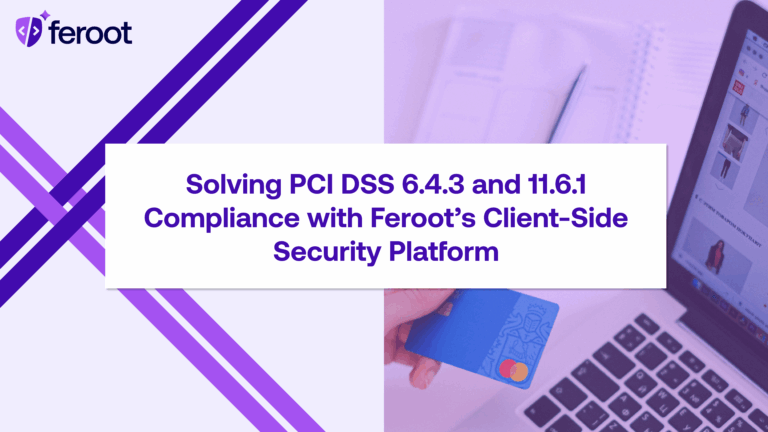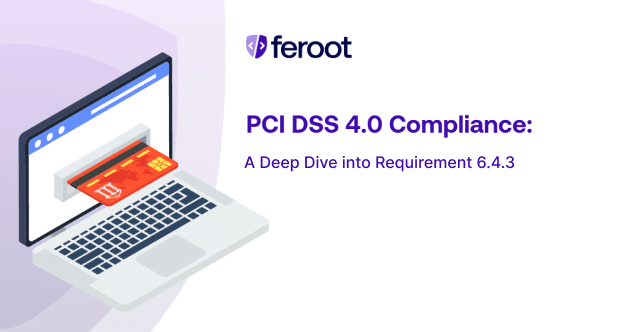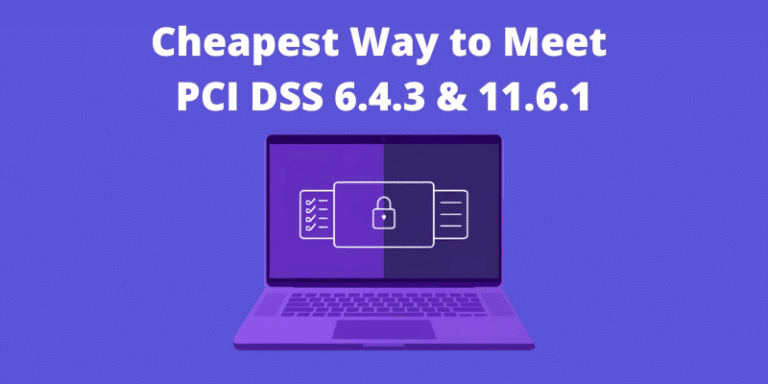Introduction
For modern e-commerce sites and retail platforms, protecting customer data requires more than backend firewalls—it demands visibility into the browser-side security layer. Increasingly, attackers like Magecart target this blind spot using malicious JavaScript, often injected through third-party scripts. These skimming attacks result in stolen payment data, financial losses, and compliance violations under both PCI DSS and the General Data Protection Regulation (GDPR).
This article explores how DomainGuard and PaymentGuard AI work together to deliver airtight client-side security, enabling businesses to achieve e-commerce compliance, prevent formjacking, and meet all applicable security requirements.
What Is CSP and Why It’s Critical for Compliance
A Content Security Policy (CSP) is a browser-enforced standard that governs which scripts and resources a web page can load. A properly configured CSP helps enforce JavaScript security by allowing only trusted domains, which is essential for website data protection.
This capability is crucial for retail website security, where malicious script blocking can stop real-time attacks from rogue vendors or compromised third-party tools. Without strict CSP configuration, attackers can exploit browser sessions to execute unauthorized scripts that compromise user data and violate PCI DSS compliance.
Magecart and Web Skimming: Browser-Side Threats Explained
Magecart groups specialize in injecting hidden scripts into checkout flows to harvest payment card data. These attacks fall under a broader category of web skimming, where attackers silently exfiltrate data from within the browser—bypassing traditional server defenses.
Because most e-commerce platforms rely on a wide range of third-party services, the attack surface grows exponentially. This opens the door to supply chain attack mitigation issues, as vulnerabilities can be introduced by tools like tag managers, analytics, or A/B testing scripts that load from external sources.
What makes Magecart particularly dangerous is that the injected code often looks legitimate and runs silently—capturing credit card data, IP addresses, and other sensitive customer information undetected.
PCI DSS for E-Commerce: Modern Compliance Requirements
With the release of PCI DSS 4.0, new mandates address the client-side environment directly. According to the PCI Security Standards Council, organizations must inventory and monitor all scripts loading on payment pages, and ensure those scripts are authorized and unaltered.
Failure to meet these requirements doesn’t just put customer data at risk—it can lead to penalties, reputational damage, and revoked payment processing privileges. For businesses operating online, PCI DSS for e-commerce is now both a legal and operational necessity.
DomainGuard ensures compliance by providing audit logs, policy enforcement, and real-time alerting—all required elements of modern online payment compliance programs.
DomainGuard and CSP Enforcement
DomainGuard automates CSP configuration across digital properties. It identifies all scripts running in the browser, enforces a trusted set of domains, and blocks unknown or unauthorized resources—crucial for Magecart prevention.
The system continuously analyzes script behaviors, adjusts CSP headers dynamically, and alerts security teams when policy violations occur. This ensures that third-party script control is maintained without requiring manual intervention.
By enforcing script integrity and source verification, DomainGuard addresses both website data protection and supply chain attack mitigation, significantly reducing the risk of compliance failure or data theft.
PaymentGuard AI: Securing Checkout Experiences
PaymentGuard AI works alongside DomainGuard by focusing protection on the most vulnerable real estate: checkout and payment pages. This is where formjacking and credit card skimming attacks typically occur.
Using advanced behavioral analysis, PaymentGuard AI detects script-based anomalies such as keystroke tracking, DOM manipulation, or unauthorized form field access. It intervenes in real time, preventing data from being intercepted during the transaction process.
This capability is essential for maintaining a secure checkout experience, enhancing customer data security, and demonstrating due diligence during compliance audits under both PCI DSS and data protection regulation GDPR.
Client-Side Security and JavaScript Control
Legacy web security models ignore the client-side, but today’s compliance requires visibility and control inside the user’s browser.
By combining browser-side security tools with behavioral analytics, companies can reduce reliance on perimeter defenses and stop attacks where they happen. Client-side monitoring becomes essential as it empowers teams to see every script in action, whether it’s from a CDN, marketing plugin, or embedded widget.
And because JavaScript security is the primary concern with Magecart-style threats, organizations must treat every script as a potential attack vector until it’s validated.
DomainGuard solves this by managing domain trust and updating CSP headers in real time, while PaymentGuard AI adds a behavioral safety net on sensitive pages. Together, they enable true e-commerce compliance through intelligent automation.
Real-World Retail Security in Action
One national commerce site deployed both tools after failing a PCI audit. Their environment had 40+ uncontrolled third-party scripts and zero CSP policies in place. Magecart skimmers were found hiding in a chatbot plugin.
After integrating DomainGuard, all scripts were audited and verified. The CSP was enforced dynamically. PaymentGuard AI was deployed on checkout flows, instantly flagging anomalous behaviors and helping the brand regain trust and compliance.
In less than 45 days, the retailer met PCI DSS for e-commerce, implemented full third-party script control, and eliminated its web skimming detection gap—all while preserving fast load times and seamless user experiences.
Why Continuous Monitoring Is Essential
Both PCI DSS and GDPR expect organizations to maintain continuous monitoring of their digital infrastructure. Static security controls are not sufficient. Compliance efforts must evolve alongside the threat landscape.
DomainGuard and PaymentGuard AI support this mandate by offering:

- Real-time script tracking
- Alerts for policy violations and suspicious activity
- Automated CSP updates
- Verified domain and SSL certificate integrity
- Audit-ready reporting for regulators and internal teams
This continuous feedback loop strengthens applicable security across all web assets, especially payment pages—where even a small gap can lead to devastating consequences.
Final Thoughts
Today’s attackers thrive in complexity—and so do compliance requirements. With skimming threats like Magecart targeting the browser-side, protecting your web page environment is no longer optional.
DomainGuard and PaymentGuard AI offer a proven, scalable way to prevent formjacking, enforce CSP, and maintain PCI DSS compliance. Their combined power ensures retail website security, protects payment workflows, and safeguards both your brand and your customers.
Explore how Feroot Security can reduce your client-side risks and ensure full digital compliance—without compromising performance or customer trust.


